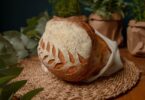Ben Rawluk
[mks_dropcap style=”letter” size=”52″ bg_color=”#ffffff” txt_color=”#000000″]P[/mks_dropcap]lague Boy shows up to the walk-in clinic on Davie fifteen minutes before it opens and there’s already a line all the way to the entrance of the Shoppers Drug Mart next door. Sleepwalkers and ghosts, mostly, except for the old guy hunching his shoulders forward and complaining about how all the restaurants in the neighbourhood keep changing. Plague Boy doesn’t want to think about his stomach right now, or about tiny feet climbing up his esophagus.
Inside, he sits on an examination table with a paper sheet crinkling under his ass. The clinic doctor is a middle-aged white man he hasn’t seen before; he’s flipping through Plague Boy’s file and poking at his phone on the counter. He doesn’t look up. Plague Boy wishes the doctor was a woman. “What seems to be the issue?”
Plague Boy wants to explain how this started: the burning sensation as tadpoles arced into the avocado-green toilet bowl. The feverish sweats that followed. Instead, he opens his mouth and a gastric-brooding frog leaps spittle-slick from his lower lip onto the patch of linoleum between the clinic doctor’s feet.
“Maybe you need to see a veterinarian,” says the doctor.
◊ ◊ ◊
The first time, it was a Panamanian golden frog; yellow skin punctuated by splotches of black. He had to look it up. “I’ve never even been to Panama,” he told his boyfriend. Looking at it gave him a migraine. He called in sick to work.
◊ ◊ ◊
Plague Boy curls his toes under the hot spray of the shower. When he got back to the apartment after the clinic, he pressed his back to the front door and let himself let go, coughing up more of them—a file-eared frog, a red-back tree frog. They landed on the floor and he scooped each of them up, cradling them in his arms before dumping them in the toilet and flushing.
The hot water cuts out when his boyfriend, Simon, runs the tap on the other side of the shower curtain. Simon spits into the sink. “They didn’t prescribe you anything?”
“Like what?” Plague Boy’s right armpit is tender; he reaches up to pop what feels like a zit and a green mantella frog falls into the water before being carried into the drain. “The doctor spent the entire time Googling.” Plague Boy had expected the doctor consulting medical texts would look more like a wizard rifling through ancient grimoires, not thumbing through Wikipedia on his phone.
“Which one was it?”
“I haven’t seen him before. White guy in his forties?”
“Hot?”
“No.”
Simon snorts.
Plague Boy reaches for the shampoo. A long-nosed horn frog is nesting in his hair. “It’s not a common condition,” Plague Boy says, digging fingers into his hair to remove the frog. “I’ll figure something out.”
“Don’t let it fester. Chad says—“
Fuck Chad, Plague Boy wants to say, but doesn’t. He’s trying to be a good boyfriend. Simon has been best friends with Chad since high school and Plague Boy doesn’t want to be that asshole, doesn’t want to sound jealous. A plague of frogs is enough of a deal-breaker. “I’m not letting it fester,” he says. “I went to the clinic. I’m telling you about going to the clinic.”
“I’m just saying—”
“I know what you’re saying,” Plague Boy says. He presses his palms against the tiles, spreading his fingers. He wants to say that he can’t stop thinking about his entire body dissolving into amphibians, can’t stop thinking about what happens when all that’s left is the plague. That sometimes he wonders about wanting it to happen. He doesn’t say any of that. He isn’t Chad. “Chad would probably find his own cure,” Plague Boy says, halfway under his breath.
The door opens and closes.
◊ ◊ ◊
Simon is the cook, but Plague Boy is going to make things up to him with risotto. They already have olive oil and half an onion. There are several packages of arborio rice in the pantry because Plague Boy always buys too much. He makes a list on his phone.
The grocery store is across the street. Plague Boy sucks his stomach in—tries to hold the plague in—and takes a black basket as he passes through the sliding door, maneuvering around a woman arguing with her toddler. He snags deli guacamole—Simon’s favourite—and wends his way through produce, dodging customers and the store employees in the middle of restocking. He avoids eye contact with Cute Produce Boy, the short one with the arms and the glasses.
Plague Boy picks up a shrink-wrapped carton of brown mushrooms. He selects fresh rosemary. He examines each bundle of asparagus like he knows anything about vegetables. Cute Produce Boy is standing right behind him. “Uh,” Plague Boy says.
There is a harlequin toad hovering in mid-air by the mushrooms, wiggling as though hung on a long strand of fishing wire.
“We’re concerned that they’re a health hazard,” Cute Produce Boy says; he is somewhere between confused, angry and embarrassed. And then Plague Boy can see other frogs untethered from gravity—one by the guacamole, one sticking to the glass of the sliding door. “We’ll have to ask you to leave.”
◊ ◊ ◊
According to Xtra West, there is a mermaid who works as a lifeguard at Kits Pool, the only saltwater pool in Vancouver. Maybe it’s a long shot, but mermaids are amphibious—like frogs. Maybe she has some cure, some ancient Atlantean potion that will clear this up like acne.
As he crosses the bridge, Plague Boy scrolls through the article on his phone. He’s on foot because this way, the wind catches each three-toed froglet and spadefoot toad as they appear and sends them blowing off into the sky. He is starting to think of each one of them as part of himself, like he is losing himself. Memories, maybe feelings or personality traits.
He can feel the wind roaring over their bodies as they shoot up.
When Plague Boy steps onto the paved path running around the outdoor pool, the mermaid is atop a lifeguard chair, hands cupped around her mouth like a megaphone: “Kenny Williams! Walk, don’t run. You’ll hit your head and then your father will go bankrupt from grief.” The mermaid has bleached hair with dark roots. Her ratty Tourism Vancouver shirt rides up and he can see blue veins marbling her belly, leading down to the tail. The tail doesn’t look real, looks like she’s shimmied her legs down into a monstrosity of papier mâché. He can’t help thinking about Ariel meeting Ursula in The Little Mermaid. He’d be willing to give up his voice, right?
“You’re not allowed to bring frogs into the pool,” the mermaid says.
“Is the tail real?”
The mermaid rolls her eyes; she must get the question all the time. “You think all this dry land is good for my complexion?”
“I’m sorry—”
“What do you want? You better not be sniffing around for treasure.”
“I need your help.”
“Or you want to fuck a mermaid.”
Plague Boy blinks, tilts his hips, wants to ask if gaydar exists under the sea. “Uh,” he says. “I need your help, actually.” He almost chokes on the word actually, a glass frog crawling out from under his tongue.
The glass frog pinwheels through the air until the mermaid reaches down and snatches it. “Huh,” she says. Plague Boy can feel ghost digits brushing over his own stomach. The mermaid holds the glass frog in a cage of fingers.
Plague Boy has never seen a glass frog before, organs almost fully visible through translucent skin. Plague Boy remembers Grade 8 science class, the year he sat beside Corey Burton and wrote him a love sonnet; they’d had to dissect frogs, splitting open seams and extracting dyed, colour-coordinated organs. They laid them out in metal dishes, careful not to lose any pieces because Mister Kimball had to Frankenstein them back together after class. Plague Boy feels exposed, like he’s the one scrambling to free himself from the mermaid’s fingers.
“I can find the root of your problem,” she says. Her lips pull back to reveal teeth that remind him of an angler fish. She presses her thumb into the glass frog’s belly.
He wraps his fingers around the metal leg of the lifeguard chair and winces. Frogs in his gut swirl tighter and tighter, clumping into an amphibian space elevator.
“Let me have this,” the mermaid says. Her fingers rub against the glass frog’s twitching leg, his twitching leg. He realizes she wants to eat the frog.
Would he cease to exist?
“This was a mistake—” he manages.
“Samantha Belmont,” says the mermaid, looking out over the pool. “You’d better not be peeing over there.” Her fingers uncurl and the glass frog slips free. She sighs. “Once upon a time I would have made her drown herself. Happily.” The glass frog ribbits as the updraft catches it. The mermaid isn’t watching. “Do you ever look at where you’ve ended up and hate yourself a little bit?”
◊ ◊ ◊
Plague Boy examines every piece of dirty laundry to get rid of any trapped frogs. He’s making four piles—bright colours, dark colours, light colours, towels. Normally he would split them into two, dark and light, but he should do it Simon’s way. Simon is somewhere else—probably talking to Chad. He needed a break from the frogs, he said. Last year, they had an infestation of moths, laying eggs in the dry goods. The building manager sent a threatening note. They threw everything out and Simon spent weeks murdering each moth he found with a metal spatula.
Plague Boy hates going down to the basement to do laundry. The building manager, Matilda, works out of a closet next to the laundry room. Plague Boy tries not to make eye contact. A single tree frog backstrokes behind him. If he stays calm, maybe he can stop the frogs from propagating until he’s upstairs and Matilda won’t see.
“Hello,” Matilda says, narrow face looking up from her screen.
“Hi,” Plague Boy says as he passes. The tree frog croaks and he coughs for cover, like he’s in a heist movie. There are three washers against the wall and three dryers lined up under the window. There is a counter beside a sink at and a shelf of discarded books. Plague Boy spits a bulbous frog into the sink. It slops onto the stainless steel and then looks back at him. The tree frog glides by. Plague Boy opens a window wide enough to shoo the frogs outside.
“What are you doing?”
Plague Boy can feel another frog welling up. “Uh,” he says. “I was opening a—”
She is standing in the doorway and he hopes that she hasn’t seen the tree frog hovering outside the window. “Ground floor,” Matilda says. Outside, the street runs alongside the building. “Someone could climb inside and have the run of the place.” When Plague Boy doesn’t move, Matilda makes a gestures like hurry up.
Plague Boy shuts the window. “Sorry,” he says. He can feel them bursting under his shirt. “I’ll just, uh, put these loads on and get out of your hair.”
◊ ◊ ◊
“We’re going to get evicted.” Tall and lanky Simon is walking around the apartment, peeling frogs off the walls and ceiling and stuffing them inside a black garbage bag. He’s wearing a pair of purple latex gloves out of a cardboard box under the bathroom sink—some of them are toxic, after all—but he is still gentle. He reaches up and plucks them from mid-air, making a face each time.
“She didn’t see,” Plague Boy says, stretching his arm up to pull a blue poison dart frog off the ceiling. He can’t reach, so he drags a chair to the centre of the room and climbs it.
“This isn’t getting any better.”
“I know,” Plague Boy says. He spits a horned marsupial frog into his hand and shoves it into the garbage bag. The croaking bag grows louder and louder and starts to rise toward the ceiling like a helium balloon.
◊ ◊ ◊
Plague Boy can’t keep calling in sick to work at the library. Eventually he goes in to the main branch, drifting into the back and then out to the shelves with his head down, trying to avoid everyone. He checks the re-shelving trucks on the third floor, taking handfuls of books and wandering the stacks with them, followed by a flying frog that backstrokes alongside him.
He is prying two books apart to shove a third book between them when his friend Ang shows up, settling against the shelf. “It’s creepy,” she says, poking at the flying frog while it drifts away, still staring. “It looks like it’s trying to say something.”
“I don’t know what to do about it,” Plague Boy says.
“I met these witches at a house party the other night.”
“House party witches never end well.”
Ang’s nostrils flare uncomfortably and then she flattens the flying frog against the end of the shelf with a reference atlas; Plague Boy’s guts convulse and twist and he lurches forward, books flying everywhere.
◊ ◊ ◊
Plague Boy has no other ideas, so he goes back to the mermaid. Today she’s cursing out a pack of fourteen-year-olds at the opposite end of the pool. “Look at these assholes,” she says without tearing her eyes away. “I should be driving them to suicide.”
“Wouldn’t you lose your job?”
“I know I’d lose my job,” the mermaid says. “I don’t do that anymore. I’m just saying.” She pokes at her lower right tooth with her tongue before looking down at him. “I knew you’d change your mind.” Her eyes follow the loop-de-loop of the frogs haloing around his head. “Your problem reminds me of being back home,” she says. “I need a fresh one for an accurate diagnosis.” She holds out her hands and says, “Open up.”
The mermaid is right: his mouth is filling with a newly birthed creature. He tries to pick up the newborn’s signals, tries to work out what piece of himself has materialized. The mermaid wants to eat a frog to divine his problem, but maybe he can hold it under his tongue instead?
“Seriously,” the mermaid says. “Let me do the taste test already.”
A long, slim map-tree frog—green-skinned, with deep red splotches across its back like continents—is born. She takes it right out of his mouth like a magic trick.
She opens her mouth and he thinks of piranhas.
When Plague Boy was nineteen, with an entirely different boyfriend, he got his navel pierced. Plague Boy winces now like he winced then, knowing the sharp sensation coming—
The teeth come down and Plague Boy convulses. He brushes his fingers along a wound he imagines bursting open along his belly. People are looking over at them. The mermaid is chewing like the frog is made of gum.
“Well,” he says, hoarsely.
She looks at him, stricken, like she’s going to throw up. Plague Boy would laugh if there wasn’t something big working its way out of his belly. Plague Boy has never produced a frog this huge; less like coughing up a wad of wriggling phlegm and more like passing a meteor-sized kidney stone. An armoured mistfrog emerges from Plague Boy’s mouth, expanding upon contact with the open air—pale, sandy skin like the beach on the other side of Kits Pool’s white iron fencing, mottled with wild, darker patterns. If he wasn’t convinced this was his entire soul leaving his body, Plague Boy would be impressed.
By the time its final toe is out past Plague Boy’s lips, the armoured mistfrog is the size of a horse; Plague Boy lies sprawled on the unyielding cement while the armoured mistfrog croaks thunderously. Plague Boy feels emptied, hollow, little more than skin.
◊ ◊ ◊
Plague Boy lies on the living room floor, uncertain of exactly how he got here, giving birth. Maybe he climbed onto the giant frog’s back and they floated up and over the water like a balloon. Maybe he clambered off the amphibian’s back, jumping onto the concrete balcony. Maybe he overturned Simon’s herb garden in the process, dirt and rosemary and basil going everywhere.
Maybe he dreamt that.
The giant frog now fills the living room, most of the furniture pushed out of place, piled up against the windows looking out onto the balcony and False Creek. A massive tongue sweeps through the air, scooping up its smaller cousins and guiding them into that vast mouth. When Simon comes home, Plague Boy will have to explain this. We have a new roommate, he’ll say, because the building doesn’t allow pets.
Plague Boy’s shirt is pushed up and his skin is pocked, a map of emergency exits. Plague Boy pulls idly at the hairs on his stomach, winding them around his fingers, plucking at them like an instrument. Plague Boy imagines a long umbilical cord running from his belly button to the underside of the mistfrog. He imagines the plague overtaking him, his body fragmenting—frogmenting—becoming a chorus of frogs, one croak cascading up and down the line like “Row, Row, Row Your Boat” being sung in rounds. What would it feel like to spread out like that, his molecular structure redistributed to so many tiny amphibians? Would he even understand that feeling after certain parts of him were gone? Will he even think like this? Will he even think, or will the frogs be having a philosophical debate?
Wouldn’t it be easier?
 Ben Rawluk is a poet and fiction writer living in Vancouver, British Columbia. A graduate of the University of British Columbia’s MFA program, his work has appeared in the Antigonish Review, Malahat Review, Descant and most recently in Maisonneuve. He is a senior editor at Poetry is Dead.
Ben Rawluk is a poet and fiction writer living in Vancouver, British Columbia. A graduate of the University of British Columbia’s MFA program, his work has appeared in the Antigonish Review, Malahat Review, Descant and most recently in Maisonneuve. He is a senior editor at Poetry is Dead.






